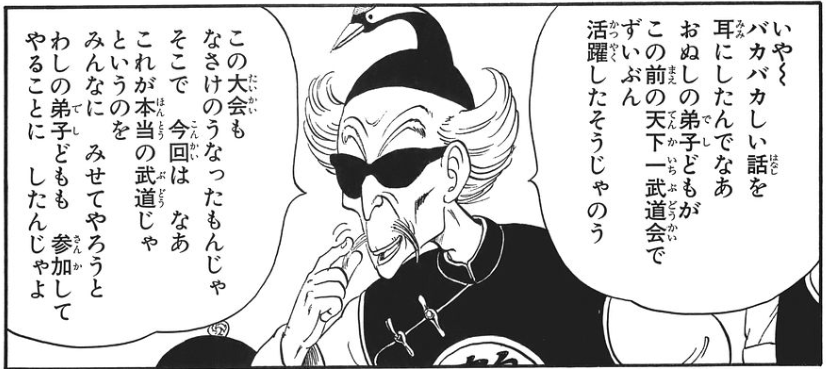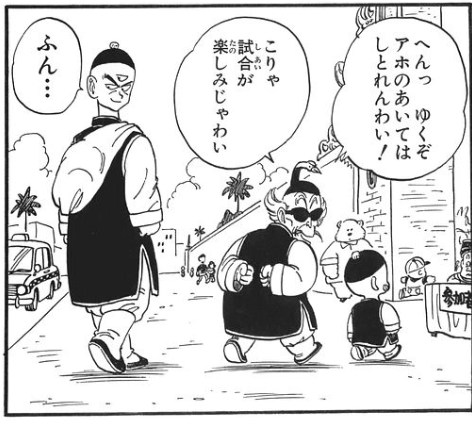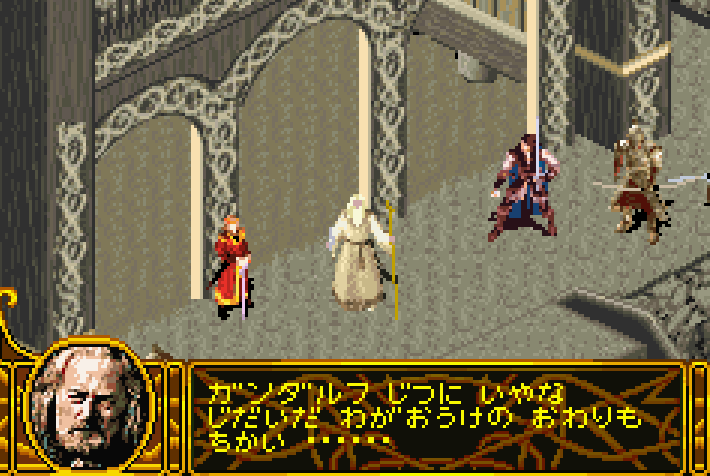Older people have a distinct way of speaking in Japanese media, especially pop-culture, as we shall explore in this short essay:

ひっひっひ あいかわらずクチもカオも わるいのう
いや~ バカバカしい話を耳にしたんでなあ おぬしの弟子どもが この前の天下一武道会でずいぶん活躍したそうじゃのう
この大会もなさけのうなったもんじゃそこで 今回 なあ これが本当の武道じゃというのを みんなに みせてやろうとわしの弟子どもも 参加してやることに したんじゃよ
へへえへ…すまんのう
優勝は わしの弟子のいただきじゃよ ハジをかかんうちに とっとと帰ったほうがいいんじゃないか?
The highlighted phrases and pronouns all represent the elderly Hiroshima dialect that is popularly used to convey a nuance of seniority, ancientness or in general sounding like Father Christmas.
Namely, the pronouns washi (わし, “I”) and onushi (おぬし, “thou”) and typically used by speakers of this senior sociolect. Furthermore there are the sentence copula じゃ plus the emphatic particles のう and わい, typically in current times only used by older dialect speakers.
Washi derives from watashi (わたし), the gender neutral first person singular pronoun, whereas onushi is an archaic second person pronoun in the singular literally "honourable master (御主)," but denotes a level of informality contrary to how it may sound. Washi dates back to the Edo period, 1600 - 1870s CE.
The existential verb is oru (おる) usually elided into auxiliary verbs such as しておる = しとる as seen in the one of the following lines from the ageing and cackling martial arts master:

へんっ ゆくぞ アホのあいてはしとれんわい!
Shitoren (しとれん)= shiteorenu (しておれぬ) = To not be able to do. Using here the archaic negative particle nu, but in the actual script elided into n, a fairly standard male mode of speech. He also uses the archaic form yuku(ゆく) of iku (いく, “to walk, to move”).
Returning to oru, the word is in regular contemporary Japanese primarily reserved as the humble alternative to iru. One will however usually encounter the humble verb in its polite conjugation orimasu (おります). It dates back to pre-mediæval times.

Looking towards translations of English works, such as the Game Boy Advance game Lord of the Rings: The Two Towers, we once more encounter the venerable elderly dialect in the form of the mighty Valar and Wizard, Gandalf the Grey as he is talking to King Theoden, to which His Majesty first begins:
ガンダルフ じつに いやな
じだいだ わがおうけの おわりも
ちかい ……
Gandarufu jitsu ni iyana
Jidai da waga ouke no owari mo
Chikai ... ...
Gandalf, it is verily a detestable age.
Our royal house is nearing its end.
And Gandalf replies:
すべて サルマンの しわざじゃ
セオデン おのれを せめなさるな
たしかに かれの いかりは
まけんじゃ しかし まだ
まけてはおらぬ
Subete Saruman no shiwaza ja
Seoden onore o semenasaruna
Tashika ni kare no ikari wa
Maken ja shikashi mada
Makete wa oranu
All of this is Saruman’s work.
Theoden, you yourself shall not attack
Truly, you would lose against his wrath,
However, you will not lose to him.
"ja" once more can be seen, as can the archaic negative particle in "oranu" (is not), but we also see the informal negative conjugation of the polite imperative semenasaruna (せめなさるな, you shall not attack), which points towards Gandalf being decorous towards King Theoden as he is the leader of his country and a respected friend of the Fellowship.
The King then responds,
だが われらに ちからは もうない!
わしの えりすぐりの へいしたちは
おいの エオメルに ついていった
Daga warera ni chikara wa mou nai!
Washi no erisuguri no heishitachi wa
Oi no Eomeru ni tsuite itta
However we have no might!
My very best soldiers have left along with my nephew, Eomer.
To which Gandalf replies:
そうじゃの あんたへの しんらいは
うすれておった じゃが すべてが
なくなったわけではない これから
とりもどせばよいのじゃ おうざは
まもられたのじゃから!
Sou jano anta e no shinrai wa
Usurete otta jaga subete ga
Naku natta wake de wa nai korekara
Torimodosenebayoi no ja ouza wa
Mamorareta no jakara!
That is indeed true, their reliance upon you
Has grown weak, that means not that all is lost, afterwards,
You should do well to recover, as the throne as been protected!
Few things of note here, namely Theoden himself is also a washi user and refers to himself and his royal household with the formal warera. He also uses the formal possessive waga to refer to his royal lineage. Gandalf overall uses the amiable anta towards Theoden, whereas anata, whence the informal second person pronoun stems, would be more fitting when referring to a king or perhaps even anatasama.
Gandalf also uses the emphatic particle no which corresponds to the standard Japanese ne that adds an element of friendly assurance or questioning. He uses the respectful passive tense with mamorareta (you have protected the throne) in reference to Theoden having warded off the attackers. Gandalf prior to this uses yoi corresponding to ii in standard speech in conjunction with a seneba construction to imply an imperative or cohortative, that is a wish or command, in order to instil a sense of confidence in the despondent king.